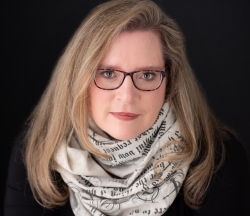It’s The Final Countdown! (But I wish my memoir wasn’t quite so relevant)

My memoir is about to be released. For years as I contemplated publishing, I’ve felt equal parts excitement and terror. I figured that was par for the course for most memoirists. What I didn’t expect was that on the eve of publication, I’d feel so much heartache.
One early reviewer wrote “Born and Razed is a gripping, unflinching memoir that reads like the chilling prequel to The Handmaid’s Tale – except every word is painfully real.” (M. Morley) While I agree with his perspective, it doesn’t make me feel any better.
I don’t much like the idea of RE-living the prequel to the Handmaid’s Tale. I’ve already escaped one version. But every painful glimpse at the news sucks me right back in it. Except this time, it feels much scarier. This time, instead of being trapped in a cult of several hundred, I’m feeling the threat of a cult with hundreds of millions of followers.
You Can't Outrun Trauma (and benzos won't help either)

I used to be a teacher.
Just typing that sentence has me crying. Well, sobbing is more accurate.
It’s been almost five years since the morning I ran to my principal’s office and begged him to cover my class for a day. Never in my wildest dreams would I have imagined it would be the last day of my career.
When Hope Hurts (But It's All You've Got)

It hurts to lose. But it hurts even more to lose hope. And I think that loss is what many of us are feeling so intensely this week.
I know I’m not alone in feeling the pain of shattered hope. Prior to Black Tuesday, hope kept me afloat. While the polls worried (and frankly shocked) me, I chose to remain nauseously optimistic. Surely, I reasoned, when democracy and the rights of over 50% of the population is at stake, most people will vote with integrity.
Clearly, I was wrong. I’m Canadian, but I feel the pain of my American neighbours, friends and family who are afraid for their nation, their rights, even their lives.
Ever since that day, I’ve been trying to access hope again. And in the process, I’ve been thinking how strange it is that hope can hurt as much as it can be a lifeline.
Why Does Trump Trigger Me? I'm not even an American!

I’ll never forget the day I found out my brother voted for Trump in 2016.
There we were, sitting in Tim Hortons for what might be our last visit ever. As it was, he rarely made the trip to Canada from his monastic community on Cape Cod. And I was not about to visit him at headquarters, then - or ever.
I had no words to say. I was as alarmed as I was bewildered.
How could he, a “Christian” monk who took lifetime vows of poverty, chastity and obedience, vote for such a lying, cheating, ignorant, immoral reprobate?
All I could think was that we had nothing left in common. Except DNA.
I Can't Stop Thinking About Aaron

I can’t stop thinking about Aaron.
His life ended this week in an extreme act of protest in front of the Israeli Embassy in Washington DC. I can’t even bear to type the specifics, but one google search of his first name will tell you every horrific detail. Brace yourself. If you value your peace of mind, don’t look.
No matter how controversial, Aaron died making a powerful political statement. Some are calling his death heroic. For most, his radical act is simply a tragedy. Either way, I’m not writing about what Aaron did. Rather, I’m writing to process my personal sorrow and grief in the aftermath.
